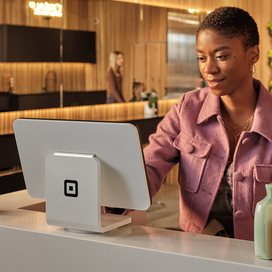Table of contents
This article is for educational purposes and does not constitute legal, financial, or tax advice. For specific advice applicable to your business, please contact a professional. Nothing in this article constitutes tax or accounting advice.
If you own or manage a salon, understanding tax deductions can make a difference of thousands of dollars. It’s worth taking a little time to understand how they work and what you need to know to take full advantage.
Here’s an introduction to tax deductions for salons to help you make the best decisions during tax season.
Salon tax deductions 101
If you’re new to tax preparation, understanding tax deductions and how they work for salons is the first step. At a high level, you can think of tax deductions as business expenses or IRS rules allowing you to lower your business’s taxable income.
For example, let’s say your business earns $500,000 in revenue over a year and spends $200,000 on various business expenses. The business expenses may be partially or wholly deductible, which could lower your taxable income to $300,000. When reviewing the tax code, you may find additional deductions you might qualify for, such as using your vehicle for business purposes, work-related education expenses, and even a portion of your cell phone bill, assuming part of your phone use is related to the business.
With good bookkeeping and accounting records, you may be able to gather the majority of eligible deductions through your bookkeeping software. However, we recommend working with a tax professional whenever you have tax-related questions or are filing taxes for your business.
16 salon-specific tax deductions to know about
While some deductions are common to all businesses, a handful of tax deductions for salons are fairly unique. Using a dedicated business bank account and credit card for all business-related spending helps you capture every deduction for your business taxes. The categories below may qualify as deductions for tax purposes, but your particular tax liability should be verified by a tax professional.
- Professional beauty supplies and products: Costs for shampoos, conditioners, hair dyes, gels, and other beauty products used to provide services.
- Salon equipment depreciation: Depreciation is the loss in value of business equipment over time. For salons, depreciation typically includes hairdryer chairs, styling chairs, manicure tables, and other specialized salon equipment
- Small tools and implements: Items such as scissors, brushes, combs, and clippers with shorter life expectancies than larger equipment may be fully deductible in the year of purchase.
- Salon-specific utilities: Salons may incur higher utility costs for water and electricity due to equipment and service needs, such as washing hair and running the equipment.
- Beauty industry education and training: Continuing education classes for hair styling, cosmetology licenses, and other industry-specific training are usually among the tax deductions for salons, whether paying for yourself or an employee.
- Salon software subscriptions: Costs for appointment booking, client management, and other specialized software.
- Professional licenses and insurance: State-required licensing fees and professional liability insurance specific to salon operations.
- Salon rental space improvements: Salon tax deductions include modifications or improvements to the salon space, such as installing new salon stations, lighting, or other decorations.
- Uniforms and protective gear: Businesses can deduct the cost of staff uniforms and protective clothing required for using certain chemicals or materials.
- Magazines and subscriptions: Subscriptions to beauty and fashion magazines and any other magazines in the waiting area for client use.
- Health and safety supplies: Costs for gloves, masks, sanitizing products, and other health and safety supplies critical for maintaining a clean and safe environment.
- Music licensing fees: If you play music in your salon, you may need to pay licensing fees to ASCAP, BMI, or SESAC, or you may have a subscription to a service like Muzak. These fees may be deductible.
- Waste disposal services: Fees for specialized waste removal services for hazardous materials like chemicals or sharp objects, like used razors.
- Beauty product samples: Costs associated with purchasing product samples for customer trials are a common deduction in the salon industry.
- Industry-specific marketing and advertising: Expenses for salon-specific marketing efforts, such as hair show sponsorships, beauty magazine ads, and targeted social media campaigns, are generally deductible expenses.
- Client refreshments: The cost of beverages and snacks provided to clients during their appointments.
This list may only cover some deductions for your salon business. Generally, if an expense is clearly related to the business, it could be eligible for a deduction. Consult the IRS website or a tax professional to understand how different expenses and deductions apply in your specific instance.
Other common tax deductions salon owners should be aware of
Many tax deductions apply to businesses with a physical location, not just salons. Many physical beauty businesses and brick-and-mortar stores may have these tax deductions at their disposal:
- Rent for business property: The cost of leasing office space, storefronts, or other premises used for business operations.
- Utilities: Basic utilities such as electricity, gas, water, and internet services required for the business’s operation.
- Employee salaries and benefits: Wages, salaries, bonuses, and benefits (like health insurance and retirement contributions) paid to employees. Tools like Square Payroll help automate payroll, benefits tracking, and taxes.
- Office supplies and equipment: The cost of office supplies, furniture, and equipment necessary for business operations.
- Insurance premiums: Premiums for business insurance policies, including liability, property, and workers’ compensation insurance.
- Professional services: Fees paid for legal, accounting, and other professional services directly related to operating your business.
- Travel and meal expenses: Costs associated with business travel, including transportation, lodging, and meals, can often be deducted, subject to IRS guidelines.
- Marketing and advertising costs: Marketing and advertising expenses, such as website development, online advertising, and print media.
Lowering your salon tax bill with deductions
Maximizing tax deductions is a critical strategy for salon owners looking to boost their profitability and operational efficiency. By understanding and leveraging the right deductions, salons can significantly reduce their tax bills, freeing up resources for further investment and growth.
How Square can help
Square for Beauty is a holistic solution in the bustling beauty sector, streamlining salon management so owners can concentrate on client services. Square Appointments simplifies scheduling, payments, and staff coordination, enabling salons to launch quickly and integrate seamlessly with existing systems through an easy setup and expert onboarding.
Square caters to various business sizes with customizable features like smart scheduling and comprehensive staff management tools. Moreover, Square aids in business growth with integrated marketing solutions, promoting customer retention and loyalty. Designed for ease and growth, Square for Beauty is a go-to tool for modern salons looking to enhance service quality and streamline operations.
![]()












